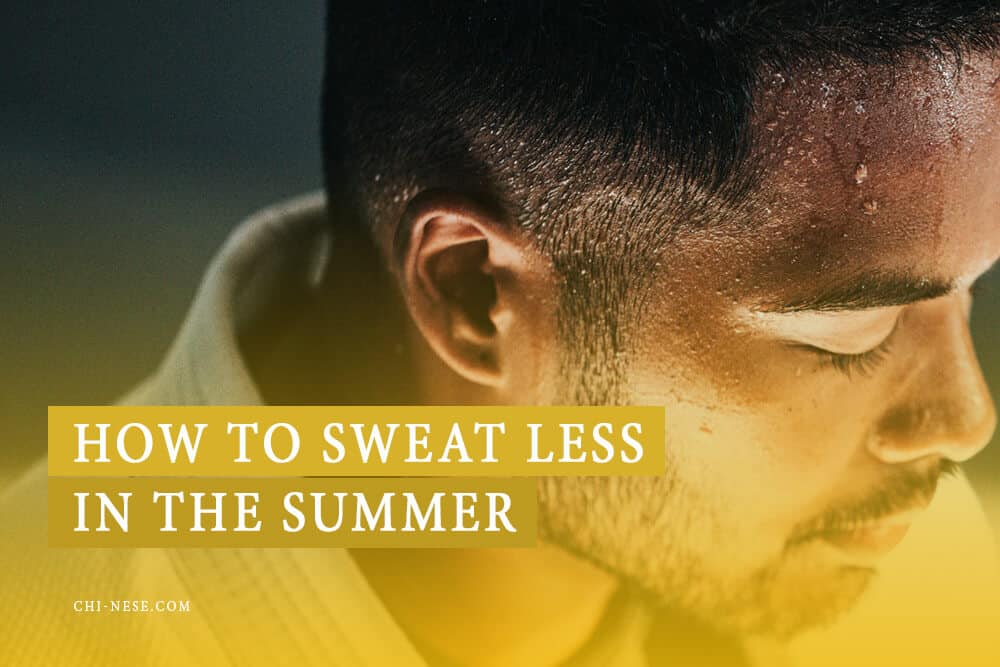Sweating is your body’s natural cooling mechanism. When the temperature rises, your body begins to sweat to help cool you down and prevent overheating. But no matter how much you sweat, there’s always a chance that you’ll overheat in these conditions. And for some people, sweating is an all-too-frequent problem.
It’s inevitable that we’ll sweat more in the summer than at any other time of year. Whether you hate feeling sticky or just want to smell less like a wet dog after your workout routine, here are some helpful tips on how to sweat less in the summer and feel better in your own skin.
Wear Light-Colored, Breathable Fabrics
During a hot summer, the last thing you want is to feel trapped in a heavy material that doesn’t breathe. Plus, you don’t want to stand out more than you have to in the heat. There are a few reasons why light-colored and breathable clothes are a good choice if you want to sweat less.
First, light colors tend to reflect heat, rather than absorb it like dark colors do. This can help keep your body temperature lower, which will in turn make you sweat less. Second, breathable fabrics allow air to circulate more freely around your body, which can also help keep you cooler. Finally, loose-fitting clothes allow more air to circulate and help prevent your body from getting too hot.
Eat Foods That Help You Sweat Less
Certain foods are known to help boost your body’s ability to sweat. For example, foods with high amounts of vitamin B can help you sweat less during the summer. Other foods that can help you sweat less include:
- Cucumbers: Cucumbers are a great food to eat if you want to sweat less. They are naturally cooling and can help to regulate your body temperature.
- Lettuce: Lettuce is another food that can help you to sweat less. It contains a substance called luteolin, which has been shown to reduce sweating.
- Tomatoes: Tomatoes are a good choice if you want to sweat less. They contain an antioxidant called lycopene, which has been shown to reduce sweating.
- Green tea: Green tea is a good choice if you want to sweat less. It contains a substance called epigallocatechin gallate (EGCG), which has been shown to reduce sweating.
You can also try eating foods that are high in water, like watermelons, apples, or peaches, or salty foods (more than you usually eat, but not too much), which help you retain water and might help you sweat less.

Use Natural Antiperspirants
If you have particularly sweaty armpits, you might want to try switching to a natural antiperspirant. Antiperspirants have chemicals that help fight off your body’s natural sweating, but natural antiperspirants work in a different way.
Natural antiperspirants are made with ingredients like baking soda, cornstarch, arrowroot powder, and coconut oil. These ingredients work together to absorb sweat and keep you feeling dry all day long. For example, baking soda is a natural deodorant that helps to absorb sweat and control body odor. Arrowroot powder is a natural absorbent that helps to soak up wetness and keep you feeling dry. And coconut oil is a natural moisturizer that helps to keep your skin soft and healthy.
Natural antiperspirants aren’t as strong as chemical antiperspirants, but they don’t cause any health problems as chemical antiperspirants can. If you have a creative spirit, you can make a natural antiperspirant at home!
Cut Back on Caffeine
Caffeine is a natural stimulant found in many foods and beverages (not only in a coffee) that can increase your body temperature and encourage sweating — if consumed in high enough amounts. It also has a diuretic effect on the body, which means that it encourages the production of urine and sweat. So if you want to sweat less and reduce the risk of dehydration, you should avoid caffeine.
If you are a real coffee lover and can’t imagine a day without coffee, there are a number of decaffeinated alternatives, either decaffeinated coffee or other coffee substitutes. Both decaf and caffeinated coffees taste the same because they are prepared the same way. The primary taste difference between decaffeinated coffee and caffeinated coffee is that the decaf version has a substantially different aftertaste. But even so, it is a great alternative for individuals who want to sweat less in the summer.
Conclusion
Sweating is a natural process, and you can’t completely avoid sweating. However, you can make it less frequent and less intense with the tips from our article. By staying hydrated, wearing light-colored fabrics, and cooling down after exercising, you can help your body sweat less in the summer. You can also eat foods that help you sweat less and use natural antiperspirants to help you sweat less in the summer. That way, you can feel less sticky and enjoy the summer more.








